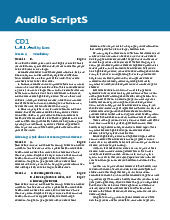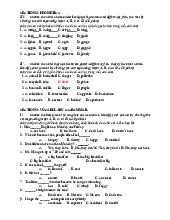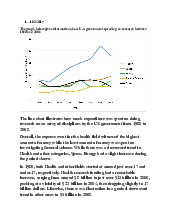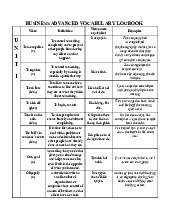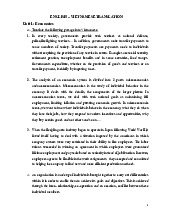















Preview text:
lOMoARcP SD| 59062190
EN1110 Linguistics: Word Formation & Morphology Exercises Morphology
1. Divide the following words into morphemes (From An Introduction to Language (Fromkin et al., 2011, p.)):
Example: replaces = re | place | s deAf R infAf
retroactive, befriended, televise, margin, endearment, psychology, unpalatable, holiday,
grandmother, morphemic, mistreatment, deactivation, airsickness, predestined
2. Identify the bound & free morphemes in these words (From Yule, 2014, p.73):
fearlessly, happier, misleads, previewer, shortening, unreconstructed E.g. fear / less F B
3. Identify the prefixes, suffixes and stems in these words:
Additional question: The prefix in has two meanings. What are they?
uncover, hopeless, heroism, freedom, changeable, preheat, postscript, cohabit, eventful, induce,
agreement, poetic, disagree, replace, sleeper, inapt
4. Identify the prefixes, suffixes and stems in these words. Do the affixes change the word class of the
stem? (From Yule, 2014, p.59) misfortune, terrorism, carelessness, disagreement, ineffective,
unfaithful, prepackaged, biodegradable, reincarnation, decentralization
5. Which of these words has a bound stem (From Yule, 2014, p.73):
construct, deceive, introduce, repeat
6. Using each of the following suffixes, give four examples of words to illustrate what word class they
form. In general, what is the word class of the stem that each suffix is added to?
(From Denning & Leben, English Vocabulary Elements, p. 44) a. –ish b. –ity c. -ize
7. What are the functional morphemes in the following sentences? (Yule, 2014, p.73)
When she walked into the room, the doctor asked me if I had a sore throat or an annoying cough.
8. Divide the following English words into morphemes and show which are stems, which are
derivational affixes and which are inflectional affixes (The Structure of Language – An Introduction
to Grammatical Analysis (Pavey, 2011, p.39-40)): a. scissors
(as in ‘Don’t run with scissors, they’ll slow you down.’)
b. gameplans (as in ‘I have several gameplans for a situation like this.’) c. polysyllabic
(as in ‘The word ambiguous is polysyllabic.’) lOMoARcP SD| 59062190 d. undercooks
(as in ‘Uncle Jim always undercooks the carrots.’) e. unlockable
(as in ‘This door is totally unlockable.’) f. globalization
(as in ‘Globalization leads to a loss of identity.’) g. procrastinating
(as in ‘Have you started to work or are you still procrastinating?’) h. forgiveness
(as in ‘You should ask for forgiveness from her.’)
9. Which of these words contains an allomorph of the morpheme “past tense” (Yule, 2011, p.75)?
are, have, must, sitting, waits
10. What are the allomorphs of the morpheme “plural” in these words (Yule, 2014, p.73)?
criteria, dogs, oxen, deer, stimuli, judges
11. English regular plural and genitive endings have three phonologically conditioned allomorphs
(variant pronunciations): [-z], [-s], and [-ɨz]. For each of the following words, form the plural and
decide which of the allomorphs is used in the process: lip, lathe, pot, kiss, tack, buzz, club, church,
garage, thug, judge, cliff, arena, path, hero, stove
12. For each of the words, identify: its word class all the morphemes the stem the root – is it free or bound?
which morphemes are inflectional which morphemes are derivational – do these morphemes
change the word class? speakers, consumption, decorating, transmitted, childishness, disloyalty,
uncivilized, breakfast, previewing, ex-husbands, spoonfuls, neo-classical, falsities, receives,
independence, misunderstandings New word formation processes
13. Identify the different word-formation processes involved in producing each of the underlined words
in the sentences below. The processes mentioned are: acronym, backformation, blending,
borrowing, clipping, coinage, compounding,
conversion (‘zero derivation’), eponym, reduplication, hypocorism, loan-translation (‘calque’)
a. We will ca r pet this room.
b. This device will s el f - d e st ru ct in 30 seconds.
c. Could you give me a quick r e cap on what’s been decided. recapitualize d. A
day r et u r n to London, please.
e. Colouring your hair was a no- no at that time.
f. Jane decided to s p ri n g- cl e a n her apartment.
g. What are the core rules of net i qu et t e ?
h. The tax court concluded that the sale was not a bo n a f i de transaction. i.
Business confidence is on the up. j.
My old man said follow the van, and don’t di l l y- dal l y on the way. lOMoARcP SD| 59062190
k. This year the show will be si m ul c a st live to 50 different countries. l.
Did you get my memo about the meeting?
14. Identify the different word-formation processes involved in producing each of the underlined words
in these sentences (Yule, 2014, p.59).
a. Don’t you ever worry that you might get AID S?
b. Do you have a x e r ox machine?
c. That’s really f anda m nt a st ic!
d. Shiel still p art i e s every Saturday night.
e. These new s k at e b oar d s from Zee Designs are ki c ka s s.
f. When I’m ill, I want to see a doc, not a vet .
g. The house next door was b urg l e d when I was b aby si tti ng the Smiths’ children.
h. I like this old s of a – it’s nice and co m fy . i.
My g u e s s is that the company will need a bai l o ut . j.
I think Robyn said she’d like a toastie for brekkie.
k. You don’t need to button it because it’s got Velcro inside.
15. More than one process was involved in the creation of the forms underlined in these sentences. Can
you identify the processes involved in each case? (Yule, 2014, p.59) a. Are you still using that old ca r- p hone ?
b. Can you Fed E x the books to me today?
c. Police have reported an increase in ca rj ac ki n g s in recent months.
d. Welcome, everyone, to ka r a oken i ght at Cathy’s Bar and Grill!
e. Jeeves, could you tell the maid to be sure to h oov e r the bedroom carpet?
f. I know there are some newbies in the group, but it’s not a difficult system.
g. I had to t emp for a while before I got a real job. h. Would you prefer a decaf? K E Y:
1. retro|act|ive, be|friend|ed, tele|vise, margin, en|dear|ment, psych|ology, un|palat|able, holi|day,
grand|mother, morph|em|ic, mis|treat|ment, de|act|iv|at|ion, air|sick|ness, pre|destin|ed
2. fear|less|ly, happi|er, mis|lead|s, pre|view|er, short|en|ing, un|re|construct|ed
3. un| cov e r, ho p e|less, h e r o|ism, f r ee| dom, chan g e| able, p r e|heat, post| s c
ri pt , co| hab i t , e v ent |ful, in| duc e, ag r e e|ment, po et |ic, dis| a g r ee , re| pl ac e, sl ee p|er, in| a pt
The prefix in means either 1) ‘in, into’ (as in no. 7, induce) or 2) ‘not’ (as in no. 16, inapt).
4. mis|fortune, terror|ism, care|less|ness, dis|agree|ment, in|effect|ive, un|faith|ful, pre|pack|age|d,
bio|de|grad|able, re|in|carn|ation, de|centr|al|iz|ation 5. All of them 6. a. -ish lOMoARcP SD| 59062190
Added to nouns and adjectives to form adjectives:
a) from the country mentioned: Turkish, Irish
b) (sometimes disapproving): having the nature of; like: childish
c) fairly; approximately: reddish, thirtyish (Also forming verbs such as abolish, establish) b. -ity
Added to adjectives to form nouns: the quality or state of: brutality, legality, purity, oddity c. -ize (also -ise)
Added to nouns or adjectives to form verbs:
a) to become, make or make like: privatize, fossilize, Americanize
b) to speak, think, act, treat, etc. in the way mentioned: criticize, theorize, deputize, pasteurize c) to place in: hospitalize
7. When she walked into the room, the doctor asked me if I had a sore throat or an annoying cough. 8. a. s ci s sor | s (i) b. ga m e | pl an | s (i)
c. poly (d) | s yl l ab | ic (d) d. under (d) | cook | s (i) e. un (d) | l ock | able (d)
f. gl ob | al (d) | iz (d) | ation (d)
g. pro (d) | c r ast i n at e | ing (i) * from pro- "forward" + crastinus "belonging to
tomorrow," from cras "tomorrow," of unknown origin. h. for (d) | give | ness (d)
9. None (was, had, - (aux), sat, waited)
10. -ium → -ia (see also millennia, compendia), -s, -en (see also children, brethren), - Ø (see also fish,
moose), -us → i (see also syllabi, alumnus (not octopus though!))-es [ɪz] (see also church, bus),
11. lip [-s], lathe [-z], pot [-s], kiss [-ɨz], tack [-s], buzz [-ɨz], club [-z], church [-ɨz], garage [-ɨz], thug [z],
judge [-ɨz], cliff [-s], arena [-z], path [-z], hero [-z], stove [-z]
12. [word] = stem, (D) = derivational morpheme, (I) = inflectional morpheme
Speakers: [speak (free root: verb) –er (D: change to noun)] –s (I)
Consumption: [con- (D) -sump (bound root: verb) –tion (D: change to noun)]
Decorating: [décor (free root: noun) –at (D: change to verb)] –ing (I)
Transmitted: [trans- (D) –mitt (bound root: verb)] –ed (I)
Childishness: [child (free root: noun) –ish (D: change to adjective)–ness (D: change to noun)]
Disloyalty: [dis- (D: no change - negation) loyal (free root) –ty (D: change to noun)]
Uncivilized: [un- (D: no change – negation) civil (free root) –iz (D: change to verb) -ed (D: change to adjective)]
Breakfast: [break (free root) fast (free root)] lOMoARcP SD| 59062190
Previewing: [pre- (D: no change) view (free root: verb)] –ing (I)
Ex-husbands: ex- (D: no change) [husband (free root: noun)] –s (I)
Spoonfuls: [spoon (free root: noun) –ful (D: no change)] –s (I)
Neo-classical: [neo- (D: no change) class (free root: noun) –ic (D: change to adj) –al (D: no change]
Falsities: [False (free root) –itie (D: change to noun)] –s (I)
Receives: [Re- (D: no change) –ceive (bound root: verb)] –s (I)
Independence: [in- (D: no change) depend* (free root: verb) -ence (D: change to noun)]
*from Latin: de- "from, down" (see de-) + pendere "to hang, be suspended"
Misunderstandings: [mis- (D: no change) under- (D: no change) stand (free root: verb) –ing (D: change to noun)] –s (I) 13.
a. conversion b. backformation
c. clipping (from recapitulation) d. compounding (conversion too? verb return to noun)
e. reduplication f. compounding
g. blending h. borrowing & compounding (bona + fide = good faith) i. conversion j. reduplication
k. blending l. clipping (from memorandum) 14.
a. acronym (“Acquired Immune Deficiency Syndrome”) b. coinage
c. infixing (“damn” inside “fantastic”)
d. conversion (noun “party” → verb)
e. compounding (“skate” + “board”) and compounding (“kick” + “ass”) and conversion (verb
“kick” + noun “ass” → adjective “kickass”)
f. clipping (“doctor”) and clipping (“veterinarian”)
g. backformation (verb “burgle” from noun “burglar”) and backformation (verb “babysit” from
noun “babysitter”, which is a compound (“baby” + “sitter”).
h. borrowing (from Arabic “suffa”) and hypocorism (from “comfortable”)
i. two examples of conversion of verbs (“to guess,” “to bail out”) to nouns.
j. two examples of hypocorism from “toasted sandwich” and “breakfast.”
k. conversion of the noun (“a button”) to a verb and blending of two words (“velours croché”), borrowed from French 15.
a. clipping (phone from telephone) plus compounding (car + phone)
b. blending (from Federal Express) plus conversion (noun → verb)
c. blending (car + hijack) plus conversion (verb → noun)
d. borrowing (from Japanese karaoke) plus compounding (karaoke + night)
e. eponym (from William Hoover) plus conversion (noun → verb)
f. hypocorism (from new beginner + -ie)
g. clipping (from temporary worker) plus conversion (noun → verb)
h. decaf is (usually) a reduced version of “a cup of coffee made with decaffeinated coffee,” so
clipping is the most obvious process. The longer word decaffeinated is a derivation via a prefix
(de-) and two suffixes (-ate + -ed) from caffeine, which was originally a borrowing from French. lOMoARcP SD| 59062190
Conversion from noun (caffeine) to adjective (decaffeinated) to noun (decaf) has also taken place.
16. The words in column A have been created from the corresponding words in column B. Indicate
the word formation process responsible for the creation of each word in column A. Column A Column B
a. stagflation stagnation + inflation b. nostril
nosu + thyrl ‘hole’ (in Old English) c. bookie bookmaker d. van caravan e. Amerindian American Indian f. CD compact disc g. RAM random access memory h. televise television i. xerox xeroxography
j. telathon television + marathon k. sci-fi science fiction l. elect election m. deli delicatessen n. scuba
self-contained underwater breathing apparatus o. scavenge scavenger p. hazmat hazardous material lOMoARcP SD| 59062190 CLIPPING
Some words are formed by clipping a part of a larger word while retaining the meaning of the
original word. If the front portion of the word is clipped away it is called front clipping . If the end
part of the word is clipped away it is called back clipping . If it is done to both the ends it is called front and back clipping . lOMoAR cP SD| 59 062 190 lOMoAR cP SD| 59 062 190 lOMoARcP SD| 59062190 BLENDING THE WORDS List Of Blending Words advertisement + inflation beauty + utility binary + digit breakfast + lunch camera + recorder cremated + remains channel + tunnel diplomacy + economics documentary + drama manmohan + economics electro + execute fantastic + fabulous feeble + debility fantatic + magazine feminine + seminar gigantic + enormous high + technology helicopter + airport international + police man + animal laundry + automat medical + evacuation medical + care motor + bike motor + hotel motorcar + cavalcade news + broadcast lOMoARcP SD| 59062190 parachute + troops sexual + exploitation smoke + fog television + evanglist video + idiot transfer + resistor volcanic + ash work + welfare education + entertainment medical + claim sky + laboratory vegetable + burger wizard + technology techno-wizard lecture + demonstration work + alcoholic information + technology BLENDING THE WORDS List Of Blending Words
advertisement + inflation adflation beauty + utility beautility binary + digit bit breakfast + lunch brunch camera + recorder camcorder cremated + remains cremains channel + tunnel chunnel
diplomacy + economics diplonomics documentary + drama docudrama
manmohan + economics manMohanomics electro + execute electrocute fantastic + fabulous fantabulous feeble + debility feebility fantatic + magazine fanzine feminine + seminar feminar gigantic + enormous ginormous high + technology hi-tech helicopter + airport heliport international + police interpol lOMoARcP SD| 59062190 man + animal manimal laundry + automat laundromat medical + evacuation medevac medical + care medicare motor + bike mobike motor + hotel motel motorcar + cavalcade motorcade news + broadcast newscast parachute + troops paratroops sexual + exploitation sexploitation smoke + fog smog television + evanglist televangelist video + idiot videot transfer + resistor transistor volcanic + ash vash work + welfare workfare
education + entertainment edutainment medical + claim mediclaim sky + laboratory skylab vegetable + burger vegeburger wizard + technology techno-wizard
lecture + demonstration lecdem work + alcoholic workaholic
information + technology infotech
BLENDING THE WORDS USED IN SENTENCES
1. The adflation has restricted the number of applications for radio advertisements from businessmen
2. The beautility of the new computer impressed Martha
3. Her mini computer has a 16 bit processor
4. The investigative journalist recorded the voice of the corrupt leader in his camcorder
5. The Cremains of Jawaharlal Nehru were thrown on different parts of India from the aircraft
6. The train chugged through the chunnel as the water had drained off
7. The docudrama on perseverance was quite impressive
8. The thief was electrocuted as he tried to jump over an electrified fence
9. The febility of the dying man worried his grand children
10. The ginormous rail accident warning machine is likely to be installed near London
11. The hi-tech supercomputer is very helpful to the scientists in weather forecast and remote sensing
12. A heliport was erected in a week-time to receive president in the village
BLENDING THE WORDS USED IN SENTENCES lOMoARcP SD| 59062190
The adflation has restricted the number of applications for radio advertisements from businessmen
The beautility of the new computer impressed Martha
Her mini computer has a 16 bit processor
The investigative journalist recorded the voice of the corrupt leader in his camcorder
The Cremains of Jawaharlal Nehru were thrown on different parts of India from the aircraft
The train chugged through the chunnel as the water had drained off
The docudrama on perseverance was quite impressive
The thief was electrocuted as he tried to jump over an electrified fence
The febility of the dying man worried his grand children
The ginormous rail accident warning machine is likely to be installed near London
The hi-tech supercomputer is very helpful to the scientists in weather forecast and remote sensing
A heliport was erected in a week-time to receive president in the village BACK FORMATION automate from automation beg from beggar diagnose from diagnosis drowse from drowsy edit from editor execute from
execution free associate from free
association grovel from grovelling
(or -l-) (adj.) injure from injury
intuit from intuition kidnap from
kidnapper orate from oration pea
from pease peddle from peddler reminisce from reminiscence resurrect from resurrection scavenge from scavenger
self-destruct from self-destruction (from destroy, destruction)
sleaze from sleazy statistic from statistics surveil from
surveillance televise from television vaccinate from vaccination
window-shop (v.) from window-shopping ZERO DERIVATION Examples of Zero-Derivations 'To go for a walk' lOMoARcP SD| 59062190
Here we have 'a walk' as a noun; yet 'walk' comes from the verb 'to walk'; this means 'walk' was
converted from a verb to make the noun 'a walk', and this is called a conversion or zero derivation
because no change was necessary to the form of the word. 'The green'
The putting-green in golf: 'green' is used as a noun here, yet is derived or converted from the adjective 'green'.
In English it is normal to find adjectives converted to nouns and vice-versa, although it may be
unclear which was the first form.
Words that are both nouns and adjectives: final, green, intellectual, total.
• He's waiting to hear back about his finals.
• What a green boat! / They're over there on the green.
• They're an intellectual crowd /She's an intellectual.
• It's a total wreck!/ It's a grand total of twenty million!
Verbs that can act as nouns: win, say, find, take.
He won the lottery / It's a big win.
They say it's a great place in summer / She had the final say.
We found some treasure / It was a wonderful find.
They're taking the week off / Let's do one more take. Verbification
Verbification happens when an adjective, noun or non-verb is converted to a verb (eg. the
adjective 'dirty' becomes the verb 'to dirty').
Thousands of words have been formed by using verbification, and the category is constantly expanding.
Examples of the most common include:
Mail, email, talk, salt, pepper, sleep, ship, train, stop, drink.
• I'll send you an email OR I'll email you.
• I'll send this by ship to you OR I'll ship this out to you.
• I need a drink! OR I need to drink.
• He needs a good sleep OR he needs to sleep, etc.
Verbification has produced many new words for everyday use, although it has been criticised by
some who believe it produces too many neologisms and slang expressions.
A neologism (from Greek νέο- néo-, "new" and λόγος lógos, "speech"), is a recent or isolated
word or phrase that is coming into common use, but that has not yet been fully accepted into mainstream language.
Other examples of verbification include: lOMoARcP SD| 59062190
Access (noun) = to access (verb) (eg access a document online)
Host (noun) = to host (verb) (eg host a chat show)
Gift (noun) = to gift (verb) (eg to gift a concert ticket to someone)
Fun fact one! To gift is in fact not a new 'verb' at all, but has been around for 400 years; it simply
fell out of use until quite recently when it made a come-back, possibly owing to its use in
comedies (along with the expression 're-gift').
Fun fact two! While the terms zero derivation or conversion may be quite recent, conversion in
language goes back to the time of Shakespeare, who loved converting words! Examples:
• 'I eared her language, lived in her eye' (from TheTwo Noble Kinsmen)
• 'He words me.' (from Anthony and Cleopatra)
• 'Where death and danger dogs the heels of worth.'(from All's Well that Ends Well)
• 'Lord Angelo dukes it well' (from Measure for Measure) COMPOUNDING
Here are several base words with the number of possible compound words. These are geared for ages four to eight:
• day - daybreak daydream daylight daytime
• ear - earache eardrum earphone earring
• wash - washboard washcloth washout washroom washtub
• wood - woodcraft woodcutter woodland woodpecker woodwork
• fire - firearm fireball firecracker firefly fireproof firework
• hair - haircut hairdo hairdresser hairline hairpin hairbrush
• down - downcast downfall downhearted downhill downpour downright downstairs downstream downtown downwind
• grand - grandchild granddaughter grandfather grandmother grandparent grandson grandstand
• news - newscast newsletter newspaper newsprint newsreel newsstand newsboy
• eye - eyeball eyebrow eyeglass eyepiece eyesight eyesore eyestrain eyewitness
• wind - windfall windmill windowpane windowsill windshield windsock windstorm windswept
• foot - football footbridge footfall foothill foothold footpath footprint footrest footstool footwear
• water - waterfall waterfowl waterfront watermark watermelon waterproof watershed
waterspout watertight waterway waterworks
• work - workbench workbook workday workhorse workhouse workman workmanlike
workout workroom workshop worktable
• sea - seaboard seacoast seafarer seagoing seasick seaside seaweed
• head - headache headband headlight headline headphones headquarters
• out - outbreak outcast outdoors outfield outcome outlook
• under - underfoot underground underpass understand underwater
Fill in each gap with a compound word formed from the word given in brackets at the end of each
sentence. (Don’t forget that each of these compound words needs a hyphen.) lOMoAR cP SD| 59 062 190
(The first one has been done for you).
1. Someone around forty or fifty is considered to middle-aged be . (middle) 2. I ordered my steak , not rare. (well) 3. If you have
, you don't lose your temper easily. (control)
4. The normal train takes seven
hours, but the train can do it in four. (high) . ( right )
5. I can't write with my left hand – I'm
6. They have the best view because they live in a flat. (top) 7. A
ticket is more expensive than one for economy class. (first) 8. She spends her time with
people, rather than with those who have different tastes or opinions. (like) 9. The president stood behind
glass when he made his speech. (bullet)
10. Answering so many emails every day is so . (time)
